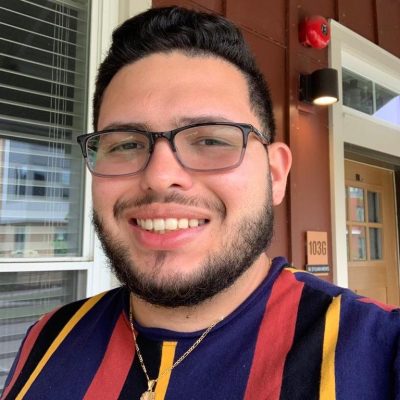Student Spotlight: Hector Loyola Irizarry

December 6, 2021
Hector Loyola Irizarry is a doctoral candidate in biomedical and biological sciences from San Sebastián, Puerto Rico. After attending the University of Puerto Rico – Mayagüez as an undergraduate, he chose to pursue further study at Cornell due to the friendly and collaborative nature of campus and the breadth and interdisciplinarity of research being done.
What is your area of research and why is it important?
The Brito Lab studies the gut microbiome, the community of bacteria that live in our intestines, and how it interacts with our bodies. Currently, the microbiome has been associated with a number of diseases, but the mechanisms behind these are not completely understood. My research is focused on creating genetic tools to manipulate the gut microbiome in a gene-specific way, which will allow us to uncover the mechanisms behind microbiome-associated diseases.
What are the larger implications of this research?
My research will open the doors to further gene-directed research of the gut microbiome, without the need to eliminate bacteria from the community. This will allow us to test the effects of various genes and their interactions between the microbiome and our bodies that could not have been tested using previous methods. Additionally, it might provide a way to eliminate disease-associated genes from the gut, paving the way for specific treatment of microbiome-associated diseases.
Can you speak to the initiatives you are involved in through the Graduate School Office of Inclusion and Student Engagement (OISE) and your field?
As a Graduate Student Ambassador under the recruitment branch of OISE, we attend recruitment events and talk to undergraduate students that are considering graduate school about our experiences as students at Cornell. For me, this experience has been very gratifying. It is one of the ways I try to give back to other Puerto Rican and underrepresented students. I hope that by sharing my experience, they can learn more about applying to graduate school and how to thrive in the research environment.
I also am a founding member of the Biomedical and Biological Sciences (BBS) Diversity and Inclusion Council. The BBS D&I Council is a group with the goal of amplifying the voices of underrepresented student groups in our field. I believe that we can help BBS students from underrepresented groups in science have a more fulfilling graduate school experience.
As a member of Fall Into Science, I’ve helped in the development of biology-themed workshops for children at the elementary school level and teenagers at the high school level.
What are your hobbies or interests outside of your research or scholarship?
I spend most of my free time playing video games, especially role-playing games, such as Kingdom Hearts and The World Ends With You. I also enjoy cooking. One of my favorite things to do is to search for new recipes and try them out in the kitchen, often giving them my own “twist” in the process.
Why did you choose Cornell to pursue your degree?
I became interested in Cornell’s BBS program due to the breadth of research that is done on campus. At the moment, my research interests spanned multiple fields in biology and I appreciated the number of options Cornell gave me to explore those interests. I ultimately chose Cornell due to the friendly and collaborative nature of the campus. When I visited Ithaca for interviews, I found that research labs collaborate often and I could delve into interdisciplinary research easily. This is exemplified by my current research lab, which spans the fields of microbiology, genetics, biomedical engineering, systems biology, and computational biology.
